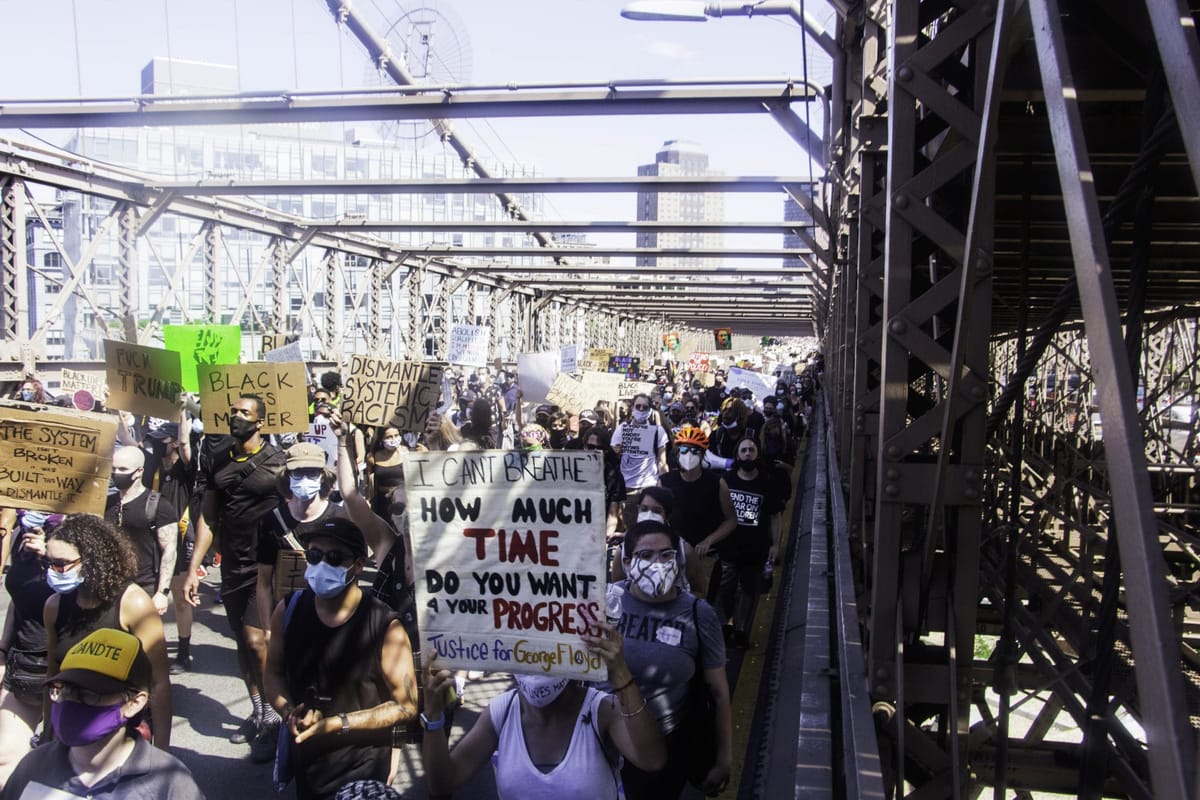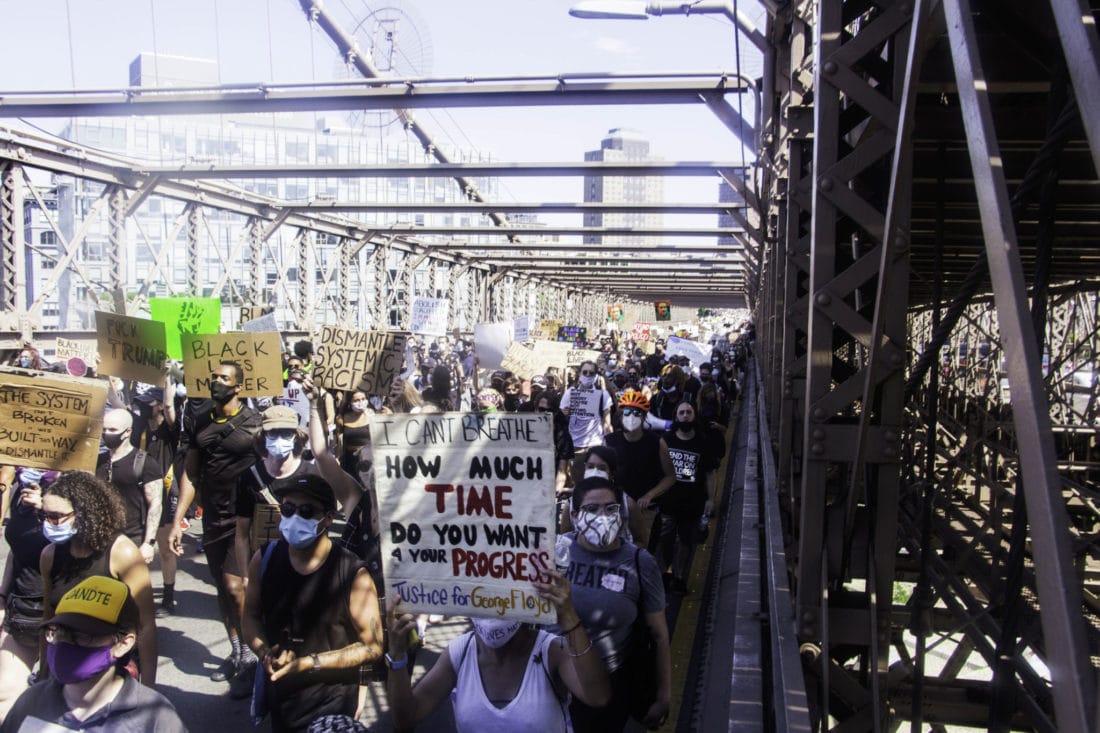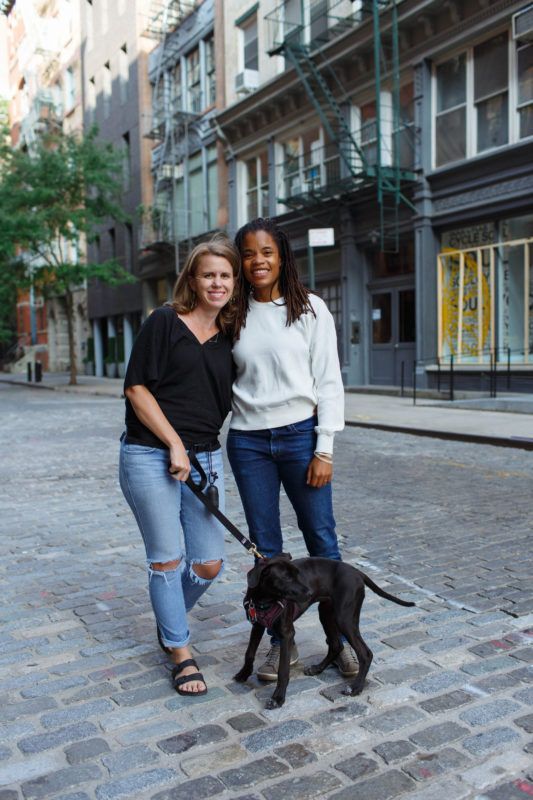‘White People. DOING Something’ Wants You to Have the Hard Conversations


When Brooklyn couple Aja Davis and Molly Ola Pinney read the imperative, “white people, do something!’ in a piece of online artwork around the time of last summer’s protests, they took it quite literally.
In the roughly nine months since Davis and Pinney launched their Facebook group, ‘White People. DOING Something,’ created hastily in the wake of George Floyd’s death, the two have watched as their platform has grown into a community of over 40,000. While the group’s base consists of white people as well as Black people and other BIPOC (Black, Indigenous and People of Color), the overarching goal is for white members – or people with ‘white-skin privilege,’ as the group’s ‘about’ section states — to address their own white privilege, as well as providing “Black people a space to be seen, heard and to show up authentically and unapologetically as who they are.”
As a biracial married couple – Davis is Black, Pinney is white – they’ve both been made acutely aware of how people’s treatment of them is often determined by Pinney’s whiteness, and Davis’ lack thereof.
“[Davis] could be in her winter coat and have a winter hat on, and be standing in the aisle of Lowes with a basket in her hand, and people would be like ‘excuse me, where are the…’ as if she worked there,” Pinney told Bklyner over the phone. Often, Pinney will also notice store associates trailing them.
“They’re just walking behind us, paying a little bit more attention to what we’re up to than usual,” she said. It’s not an occasional occurrence; rather, it happens to them constantly, Pinney said.
That same bias will also show up in the form of what Davis and Pinney refer to as “borrowed privilege.” When the couple attend meetings or events together – Pinney is the founder and CEO of the international nonprofit organization, the Global Autism Project, for which Davis works as Director of Business Development – Davis notices the difference immediately. “All of a sudden people are totally treating me differently. And I’m like ‘Oh! Oh.’”

People who haven’t spent much – or any – time in proximity to Black people might not have the kind of nuanced understanding or vocabulary needed to have productive conversations about racism, Davis and Pinney explained. That problem is often compounded by other white people who pass judgment on others for not being “woke” – i.e., highly educated on topics like racism and social justice – enough.
“And when you do that with somebody, what happens?” Davis said. “They don’t want to try anymore, they don’t want to be part of it. We’ve witnessed so many people, even among our own community, who are like ‘I don’t want to be part of this. I don’t want to be in this conversation.’”
Instead of shutting those people out of the conversation, Davis said, she and Pinney wanted to give them the opportunity to learn how to really engage, in a space that was free of this sort of dismissive attitude.
“We had this theory – that there are more people who wanted a world where racism wasn’t a thing than there are people who are like, holding tiki torches in the KKK, storming Charlottesville and the Capitol,” said Davis.
“Now we know that’s true — because we’ve gathered some of them,” said Pinney.
The group also serves as a reaction to other well-meaning — but ultimately ineffective – efforts to address the racism that Davis and Pinney have experienced and observed. One example is the numerous Venmo payments sent to Black people by white people – often total strangers – last summer, as a form of reparations. This type of action “actually reinforces the structure and paradigm that we’re working against,” said Davis. Rather than addressing instances of racism “at the level of the problem,” said Davis, ‘White People. DOING Something’ focuses on its systemic causes.
“‘White people have this privilege, oh, let me bestow it on you.’ [It’s] a bit of white saviorism hidden by the argument of reparations,” she said.
For the most part, the group’s members are grateful for the space to have these conversations, the two explained.
“We hit a need,” said Pinney.
To Stormy-Kito Diane Justice, a Black nurse living in Madison, Wisconsin who joined the group when it started and now volunteers as a group moderator, members share the burden of working toward racial justice. “The onus is not on this person, or this lawmaker, or whatever,” Justice told Bklyner. “The onus is literally on me, and you, and you, working all together. I never had that feeling of ‘hey, Black person, tell me what to do.’”
“It feels like the conversation is starting to move in a much more complex direction,” said Sydney King, Fort Greene resident and group member. Plus, King said, “I like the group’s big focus on being really pro-BIPOC, so that we don’t get into the weeds with our bullshit and our white fragility and forget that we have a purpose.”
As part of their work with the group, Davis and Pinney upload a ‘Daily Action’ to the group page daily, encouraging members to take action – from watching a lesser-known speech by Dr. Martin Luther King Jr., to committing to help bring justice to the family of Dominique Alexander. Group members post questions and comments, and Davis and Pinney have recruited volunteer moderators like Justice to ensure that commenters are in line with rules and expectations – one of the most important of which is that members do not call out or judge other members for their lack of knowledge.
Davis and Pinney also host a livestream on the page every day, something they’ve done since the group’s inception. On top of that, they offer two courses – a five-day challenge called the Social Transformation Challenge, available for free, as well as a six-week coaching program called Exponential Human Project, which costs $500. Discussions and coaching sessions with Civil Rights leaders, professors, therapists, and others explore topics like racial healing, activism, and Civil Rights.
Above all, Davis and Pinney explained, what the group creates is space for white people to listen.
“Not listen to respond, not listen and wait for their turn to talk,” said Davis. “But to actually listen to understand.”



